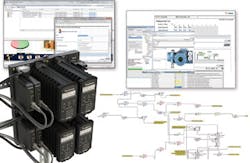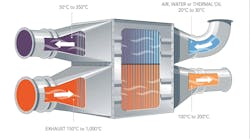Invensys Foxboro has a lot on its plate. Besides the pending acquisition of its Invensys parent by Groupe Schneider, Foxboro on Tuesday unveiled what it says is Invensys’ next-generation control system, “the Foxboro Evo process automation system."
To some extent, however, because the evolution of control systems today is punctuated by such frequent technology releases, the new system might almost as easily have been introduced last year or next year as this year.
"Some people think of I/A [the Foxboro I/A distributed control system] as 1980s technology, but there is no single aspect of the system that hasn’t been replaced over time," says Grant Le Sueur, director, product management, Invensys Foxboro.
On the other hand, says Chris Lyden, an Invensys Foxboro senior vice president, "This year we have a confluence of technology releases that make a new system, including a new controller, Triconex on the network [Invensys Triconex, the supplier of safety systems], high-density I/O, and control room enhancements."
The advances are indicative of a process-control industry rapidly adopting the latest computing advances in the pursuit of process-industry safety, security and productivity.
Roles-based productivity
The three most important ways an automation vendor can help its customers is to protect the operational integrity of their plants, enhance operational insights of its people and enable change, says Gary Freburger, president of Invensys’ systems business. "Our new Foxboro Evo system does that with unrivaled elegance. With more powerful processing capacity and other new, advanced applications, the system allows our customers to uncover new and hidden value from within their operations."
The company says the Foxboro Evo process automation system evolved directly from the Foxboro I/A Series and Triconex technology, found in some of the largest, most complex process facilities and known for their layered architecture. Foxboro Evo extends this approach through a component object-based platform, allowing major upgrades without halting operations, and confirmed by at least one representative of the oil & gas industry.
"We needed to upgrade the vast majority of our DCS, but like most sites, we didn’t have the luxury of a site-wide shutdown to make a full change possible," says Michael McKenzie, distributed control systems specialist for BP in Brisbane, Australia. "We were facing a substantial obsolescence issue, which we had ranked as a significant risk to ongoing operations, so we needed a solution that would allow us to upgrade components as we needed them, without sacrificing functionality or usability for operators. The new Invensys system allowed for a much easier upgrade of all components."
Combating information overload
In the wake of the Gulf of Mexico Deep Horizon disaster, and given the high incidence of accidents in the chemical industries, it’s not surprising that much work is being done within the process-control industry to improve the ability of operators to make sound decisions, especially in critical situations. Foxboro Evo should improve the ability of plant personnel to contribute to business success through streamlined and contextualized information.
"Operator interface screens were originally based on piping diagrams and extensive use of color in the graphics," says Lyden. "Well, piping diagrams can be at the least very inconsistent and all that color may have in the end impeded more than helped."
Results of this recognition include use of grey tones for screens, with color used only to highlight that which needs most attention. "It’s really a simple change," says Lyden. "Consistency in the screens and in use of color and use of behavior attributes to attract the eye, such as those that are used in airline consoles.
"If users in the control room and in the field can better interpret the growing volume and complexity of the information they receive within the proper context of procedures and operational risk, then they will make more valuable contributions to the business," Lyden says.
Some details
The Foxboro Evo system includes a new high-speed controller, field device management tools, a maintenance response center, an enterprise historian, 1-n redundancy and cyber security hardening. The company’s portfolio of roles-based engineering tools and productivity applications are integrated within it, for visibility into historical, real-time and predictive operating information to help drive production efficiency.
- Safety and security personnel will benefit from an innovative coupling of control and safety, which enables sharing of operational information while keeping the safety system functionally isolated, as well as state-of-the-art cyber security.
- Engineers will be able to reduce their workloads, protect schedule integrity and reduce risk via more intuitive design and troubleshooting features, virtualization and other flexible technology.
- Operators will gain a more complete, real-time view of plant activity via an updated high-performance, mobile accessible HMI.
- Maintenance technicians will enjoy lower meantime between repairs via real-time device alerts and analytics, alarm triage, performance monitoring and other benefits.
Current Foxboro I/A Series DCS users can migrate to the Foxboro Evo system with little or no downtime, depending on which version they are running. Users of competing process automation systems, whose wiring terminations are still functional, Invensys Foxboro says, can migrate to the Foxboro Evo system without ripping and replacing infrastructure, significantly reducing costs and downtime, just as they were able to do with the I/A Series system.



